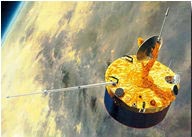European Spacecraft Orbits Venus
Europe's Venus Express probe entered orbit around Venus early Tuesday to begin a planned 16-month mission to study a planet on which the greenhouse effect has gone to hellish extremes.

The European Space Agency (ESA) probe fired its main engine today for a 50-minute braking maneuver to allow itself to be captured by the gravitational pull of Venus.
Venus Express managers at ESA's mission control center here had loaded the engine-firing commands to the satellite several days before, and had little more to do than watch their screens and hope the sequence went as planned.
It did. Using large ground antennas located in Australia and Spain, ground teams confirmed that the engine firing was a success. With the satellite 74 million miles (120 million kilometers) from Earth, it took seven minutes for the satellite's signal to reach ground teams, creating some tense moments here as the science and mission teams waited for the satellite's signal.
“It’s a great day for ESA,” said ESA director-general Jean-Jacques Dordain after Venus Express’ successful orbital arrival. “It’s a happy day for all of us,” reports Space.com
Officials at the European Space Agency's control center in Darmstadt cheered, clapped and embraced as a green line indicating a clear signal from the Venus Express appeared on their screens, a sign it had completed the maneuver inserting it into orbit.
"It's a fantastic mission for us. We've finally reached Venus," project manager Don McCoy said.
A short while later, scientists received the first data from the probe and praised the technical phase of the Venus mission ESA's fourth to a celestial body as a success.
Over the next several weeks, scientists will turn on the seven instruments on the probe and run them through tests. By June, they are expected to begin gathering information on how Venus, while similar to Earth in size and geological makeup, wound up with such a hot, dense atmosphere swathed in clouds of sulfuric acid.
"We want to learn about the mistakes of Venus for the sake of the Earth," ESA Scientific Director David Southwood said., informs ABC News.
O.Ch.
Subscribe to Pravda.Ru Telegram channel, Facebook, RSS!


